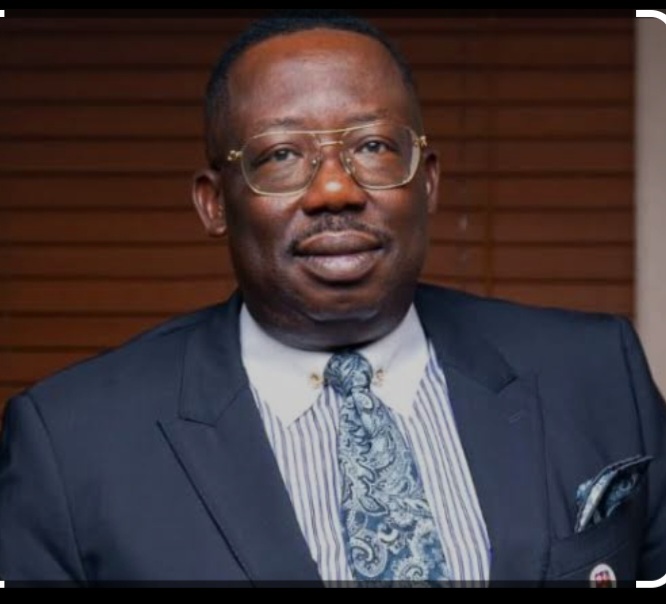Mr. Dele Kelvin Oye, President of NACCIMA and Chairman of the Organized Private Sector of Nigeria (OPSN) has called on nations to deploy knowledge, ethics and experience devoid of bias in their decision-making process in order to foster economic development and growth.
Oye made this call during the 2025 Vanguard Economic Discourse themed “Hardship and Pathways to Sustainable Recovery” held in Lagos last week.
In his welcome address, Oye said nations should deploy knowledge, ethics and experience devoid of bias in their decision-making process.
Oye made this call in the face of the ongoing tariff war unleashed by Donald Trump administration in the US which include 14 per cent tariff on Nigerian goods being exported to the US.
“In this pivotal moment, we must recognize and confront the significant challenges before us—challenges that have been magnified by the advent of America’s “America First” policy.
“This paradigm shift in global trade, driven by protectionism and tariffs, presents a unique and formidable array of obstacles for developing nations such as ours”, Oye said
Oye further said that “the world we once knew, one characterized by cooperative, rules-based trading systems under the World Trade Organization, has given way to an environment fraught with uncertainty.
“This transformation not only disrupts global markets and supply chains but poses an acute threat to our competitive standing in international trade.
“The recent implementation of a 14% tariff on Nigerian exports to the United States directly jeopardizes what has historically been a critical market for our key goods, including crude oil, liquefied natural gas, and agricultural products.
“The ripple effects of reduced demand could precipitate job losses, economic instability, and a decline in vital foreign exchange inflows, particularly for our non-oil sectors” Oye declared.
He called on the Nigerian Government to act decisively and strategically to protect the nation’s economic interests.
“In the face of these multifaceted challenges, Nigeria must act decisively and strategically. We are at a crossroads where we can reshape our economic destiny, where adversity can give rise to opportunity.”
Oye canvassed for a vision comprised of key strategic imperatives that can guide Nigeria on the path of sustainable economic development.
- Harnessing the African Continental Free Trade Area (AfCFTA): We must deepen our engagement with AfCFTA to encourage intra-African trade and bolster regional supply chains. Together, we can create a more integrated and prosperous African market.
- Diversification of Trade Relationships: It is imperative that we expand our trade partnerships beyond traditional markets, forging relationships with emerging economies such as China, India, and Brazil. Diversification is our shield against over-reliance.
- Investment in Infrastructure: Strategic investment in our transport and logistics infrastructure is essential to improving market accessibility and attracting foreign direct investment, paving the way for growth. We need to promote and insulate our special economic zones from municipal agencies’ regulatory uncertainties, towards promoting their global competitiveness.
- Diversification of Exports and Local Processing: We must nurture sectors like agriculture and technology by promoting value addition in our products, which will drive industrialization, create jobs, and multiply returns on our exports.
- Improvement of the Business Environment: Enhancing our regulatory frameworks and streamlining processes will render Nigeria a more appealing destination for investment.
- Education and Human Capital Development: Invest in our greatest asset—our people—by emphasizing vocational training and education to cultivate a skilled workforce ready to meet the demands of future industries.
- Promotion of Innovation and Technology: Establish an environment that nurtures tech start-ups and promotes research to drive sustainable economic growth.
- Engagement in Global Security Dialogues: Active participation in peacekeeping efforts and global security dialogues will reinforce Nigeria’s stature within the international community.
- Sustainability and Ethical Practices: Align our trade policies with sustainable development goals, ensuring our practices are socially responsible and environmentally friendly.
- Strengthening Diplomatic Networks: Build robust relationships with key players in the international arena to elevate Nigeria’s visibility and influence in global economic discussions.
- Law and Order: Promote ethics and compliance, strengthen our criminal justice system, and uphold the rule of law. An effective legal framework promotes business confidence and prosperity.
- Predictability in Policy: Create a policy environment grounded in stability and predictability. Genuine engagement with stakeholders before enacting laws will enhance trust and cooperation.
- The promotion of home-grown industries in Nigeria: This is essential for nurturing economic resilience and sustainable growth. By prioritizing local production and supporting small and medium-sized enterprises (SMEs), Nigeria can harness its abundant resources, stimulate job creation, and reduce reliance on imports. Encouraging investment in sectors such as agriculture, manufacturing, and technology will not only enhance domestic value chains but also fortify the economy against global market fluctuations.
- Additionally, government policies that provide incentives for local entrepreneurs, improve access to financing, and invest in infrastructure will create a conducive environment for innovation and competitiveness.
- Ultimately, nurturing home-grown industries will contribute to a more self-sufficient economy, empower communities, and drive long-term prosperity for all Nigerians.
- Alex Ekemenah


